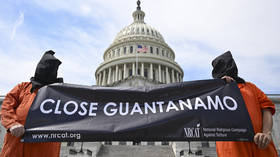Guantanamo inmates face ‘accelerated aging’ – Red Cross

The few dozen detainees still incarcerated at the US military prison in Guantanamo Bay, Cuba, are suffering rapid deterioration of body and mind, the International Committee of the Red Cross’ head of delegation for the US and Canada has claimed.
According to a statement posted to the organization’s website on Friday, Patrick Hamilton was “struck by how those who are still detained today are experiencing the symptoms of accelerated aging, worsened by the cumulative effects of their experience and years spent in detention” upon visiting the prison for the first time in 20 years. About a third of Guantanamo’s inmates have been locked up on the island for that entire time.
Steps must be taken to address the “physical and mental health needs” of the aging detainee population, requirements which are increasing in severity as they would for any superannuated population and compounded by the austerity of the living environment. Existing conditions are only making their health worse, contributing to a cycle of deterioration, Hamilton suggested.
The Red Cross representative recommended access to “adequate health care,” including emergency care, and increased contact with families as basic steps that would go a long way toward providing for the basic human needs of prisoners who may never leave the island alive.
A total of 780 detainees have passed through the notorious facility, of whom 31 remain. Despite the promises of former and current US presidents Barack Obama and Joe Biden to shut down the prison, it has been all but forgotten by many of the activists who once demanded its closure.
At least three men are currently being held at Guantanamo in “indefinite law-of-war detention” and are not recommended for transfer, including two who have been there since 2006. All three of those were previously tortured in the CIA’s “black sites” program, according to the New York Times.
Another 17 prisoners are held in law-of-war detention but could theoretically be transferred if certain security conditions are met. Just 10 have been charged in the military commissions system and one convicted; the rest remain uncharged. Ten men have been imprisoned on the island since 2002, and seven more sent there that year have died at the site.
While a 2008 US Supreme Court ruling found detainees had the right to challenge their detention on the basis of habeas corpus, only one detainee has won such a case. The prison remains a reminder of the judicial excesses of the War on Terror.














